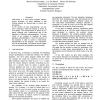Free Online Productivity Tools
i2Speak
i2Symbol
i2OCR
iTex2Img
iWeb2Print
iWeb2Shot
i2Type
iPdf2Split
iPdf2Merge
i2Bopomofo
i2Arabic
i2Style
i2Image
i2PDF
iLatex2Rtf
Sci2ools
100
click to vote
IJCAI
1989
1989
Explanation Based Program Transformation
Fold-unfold is a well known program transformation technique. Its major drawback is that folding requires an Eureka step to invent new procedures. In the context of logic programming, we present a technique where the folding is driven by an example. The transformation is aimed at programs suffering from inefficiencies due to the repetition of identical subcomputations. The execution of an example is analysed to locate repeated subcomputations. Then the structure of the example is used to control a fold-unfoldtransformation of the program. The transformation can be automated. The method can be regarded as an extension of explanation based learning.
Related Content
| Added | 07 Nov 2010 |
| Updated | 07 Nov 2010 |
| Type | Conference |
| Year | 1989 |
| Where | IJCAI |
| Authors | Maurice Bruynooghe, Luc De Raedt, Danny De Schreye |
Comments (0)

